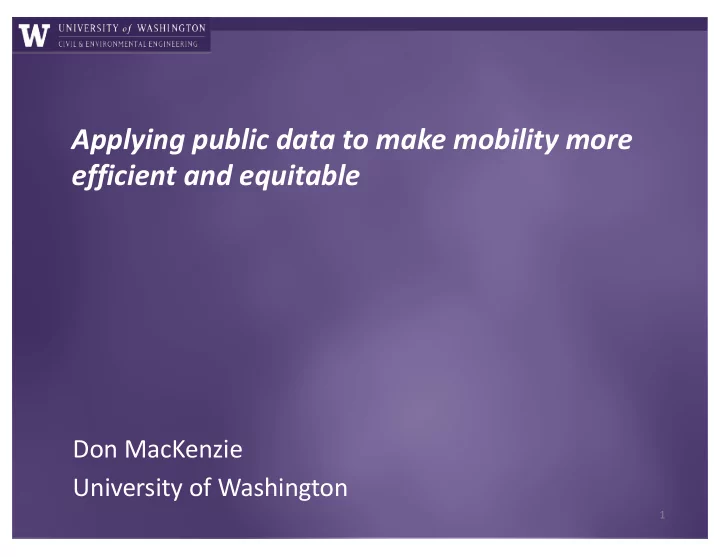

Applying public data to make mobility more efficient and equitable Don MacKenzie University of Washington 1
Sustainable Transportation Lab 2
We define sustainability broadly Sustainable Transportation System 3
Context: Revolution in Transportation Data
Traditionally, transportation data were pretty sparse, but everyone had access Rich Level of Access: How detailed are the data? Sparse Companies Government Everyone Who has access? 5
New mobility services are concentrating data in private companies Rich Level of Access: How detailed are the data? Sparse Companies Government Everyone Who has access? 6
Governments are pressing for disclosure, but data are still not widely available Rich Level of Access: How detailed are the data? Sparse Companies Government Everyone Who has access? 7
My opinion: governments should press for less data, but more widely available Rich Level of Access: How detailed are the data? Sparse Companies Government Everyone Who has access? 8
Two applications of harvesting API data to understand transportation system performance: • Is car2go competing with transit? • Do UberX drivers avoid low-income or minority neighborhoods?
Is car2go augmenting or competing with transit? Xiasen Wang PhD student Zhiyong Cui PhD student 10
car2go is being used in Seattle for some late- night trips where transit is infeasible Transit car2go 11
Lots of ways to assess complement vs competitor question • In this study: Is car2go used for trips: that are poorly served by transit – where car2go offers disproportionately large time – savings? 12
We scraped the car2go API for available vehicles every 30 seconds Compare list of available vehicles to • Vehicle ID identify trip starts & ends • Location (lat/lon) Identify origins & destinations • Vehicle condition Screen out maintenance trips • Fuel level 13
We are interested in direct, one-way trips Seattle, Jan – May 2016 Available vehicle locations from API every 30 seconds 329,478 total trips identified Total time > worst case + 30 mins 37,286 trips removed Estimated time < 2 mins 23,356 trips removed 268,836 trip in cleaned data set 14
Ability to book car2go vehicles 30 minutes ahead complicates travel time analysis ! ! ! ! !" ! !"!#$ , ! = + ! ! ! ! !" + ! ! + ! ! ∙ ! !""#$% , ! ! ! 15
To estimate walking time, assume everyone chooses closest available car ( ! − ! ! ! ! + ! − ! ! ! ! ) !" !" ! ! ! = !"!# ! 16
Pre-booking + walking time averages about 8 minutes seconds seconds 17
Parking time averages about 3 minutes seconds 18
car2go does not appear to be used where it offers extra travel time savings Actual car2go trips PSRC Travel Survey Transit Trips car2go Transit - Transit - car2go Transit - Transit - Optimistic Pessimistic Optimistic Pessimistic Walking 6.2 9.2 9.2 6.2 10.5 10.5 time In-vehicle + 17.8 33.7 33.7 16.1 31.2 31.2 transfer Pre-waiting 0 0 24.0 0 0 28.3 Total time 24 42.9 66.9 22.3 41.6 69.9 car2go 44% 64% 46% 68% savings 19
Summary • car2go does not appear to be used primarily on routes poorly served by transit • For trips taken by car2go, car2go travel time averaged 44 – 64% less than taking the same trip by transit • For trips taken by transit, car2go travel time would have been 46 – 68% less than taking the same time by transit • Based on average difference in fare of $7.19 and average time savings of 19 minutes, car2go users are paying about $23 per hour saved 20
Does UberX provide equitable service? Ryan Hughes MS, 2015 21
Do Uber / Lyft drivers discriminate against passengers based on race and/or gender? 22
There are multiple opportunities for discrimination to occur in ride-sourcing 23
Waiting times for UberX observed every 4 seconds for 2 months ~ 1 million observations of UberX waiting times from Uber API, May – July 2015 24
How do waiting times correlate with neighborhood characteristics? 25
How do waiting times correlate with neighborhood characteristics? 26
We used a spatial error regression model to test effects of density, income, minorities 27
Judged by waiting time, UberX is not just for "white & wealthy" areas 28
There are multiple opportunities for discrimination to occur in ride-sourcing Seems ok (in Seattle, 2015) 29
Summary
For many important questions, API data are a poor substitute for more detailed system data • But API data can democratize research and oversight of transportation markets • Access to existing APIs is nearly costless • We do not (necessarily) need "all" the data in order to make sound policy choices 31
A major challenge is that API data are subject to terms of use set by private companies • Access is a challenge and subject to withdrawal at any time • Common restrictions on aggregating and saving data are barriers to research • My opinion: more generous access to APIs should be required as a condition of market access, to legitimize and democratize oversight 32
Thank you! Don MacKenzie: dwhm@uw.edu @donmackenzie9 Regina Clewlow: hello@populus.ai @populus_ai
Recommend
More recommend